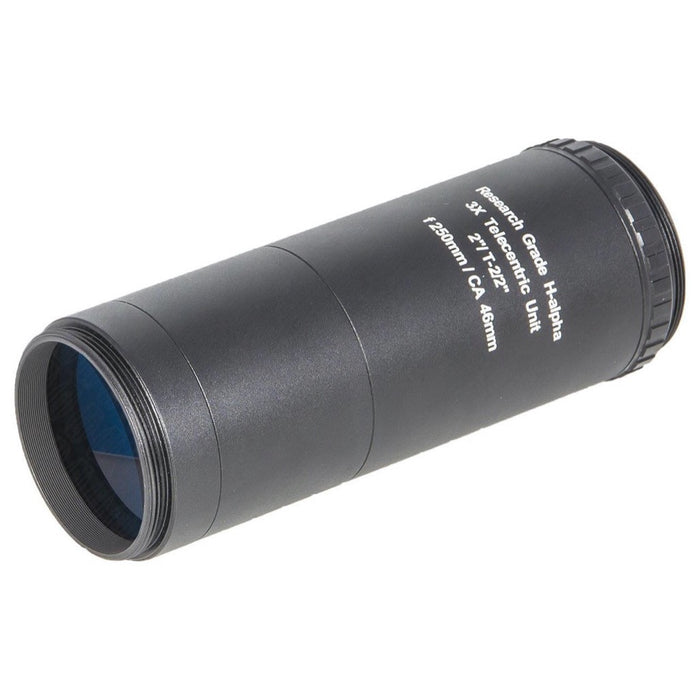
Baader Telecentric System TZ-3 - 3x Research Grade
Description
Contact us to know when we will receive our next ones!
Free Shipping in USA

Free Shipping in USA
Telecentric optics sets are often confused with a barlow lens. Both can be used to increase the focal length. Telecentric assys are designed so that the exit pupil seemingly is positioned at infinity, which means that the center ray from any point in the field appears to come from infinity and is therefore perpendicular to the image plane and parallel to the optic axis. This means that the off axis beam arrives at the image plane with the same angular geometry as the axial rays. All field elements look as if they where on axis, across the image plane and - unlike to a barlow lens - the edge field rays are not tipped bundles.
Because all the principal rays across the image plane are perpendicular to the image plane, the rays at the edge of the field will pass through an etalon just in front of the focal plane with exactly the same geometry as the rays on axis. So in an f/30 telecentric optical arrangement, the etalon sees the exact same geometry clear across the field, and the spectral bandpass does not shift in wavelength across the entire field of view.
Starting from an aperture ratio of ~f/15 (+2x Telecentric), ~f/10 (+3x Telecentric) or ~f/7.5 (+4x Telecentric), the Baader TZ-systems will create a parallel beam with ~f/30 aperture ratio. In the case of largely deviating telescope focal lengths, the clear objective aperture of the telescope should be reduced in diameter to the point that the final resulting f/ratio is close to f/30 again (we offer a suitable iris-diaphragm for this purpose, or the user can construct their own aperture stop).
TZ-system working distances – when measured from their rear lens – range from 200mm for the TZ-2 to 230 mm for the TZ-4 - to 250 mm for the TZ-3. This provides enough room for the H-alpha filter housing and most any accessories, e.g. a Baader 2" star diagonal, Binoviewer, or any conceivable camera device. The generous room of the TZ-3 will also accommodate a binocular viewer when it is mounted onto the SolarSpectrum body by means of a Baader BBHS T-2 star diagonal. All TZ-coatings are matched to the different lens glass-substrates and optimized for maximum throughput at 656 nm. Still the TZ-3 especially also works for CaK at 396 nm. The TZ-3 Strehl-ratio is well above 80% at 396 nm
Specifications
| MANUFACTURER | Baader Planetarium |
|---|---|
| SKU (#) | 2459257 |
| EAN CODE | 4047825008695 |
| WEIGHT (KG) | 0.37 |
| FOCAL LENGTH EXTENSION | 3x |
| USAGE | for H-alpha observation with SolarSpectrum filters |
| INNER CONNECTION (LENS SIDED) | Thread, T-2 (M42 x 0,75), 2" (50,8mm) |
| OUTER CONNECTION (LENS SIDED) | Thread, 2" (50,8mm) |
| OUTER CONNECTION (EYEPIECE/-CAMERA-SIDED) | Thread, T-2 (M42 x 0,75), 2" (50,8mm) |